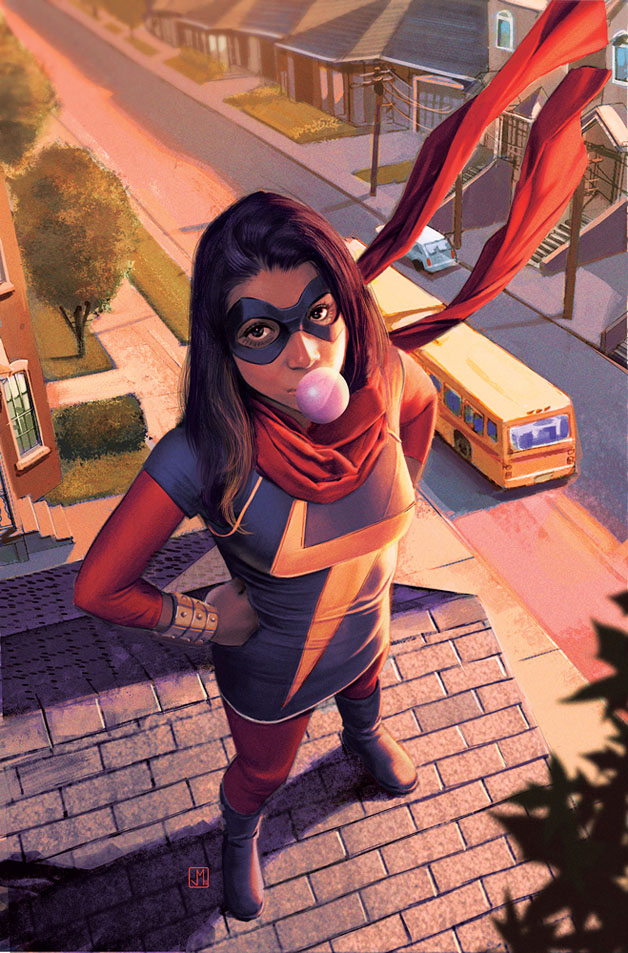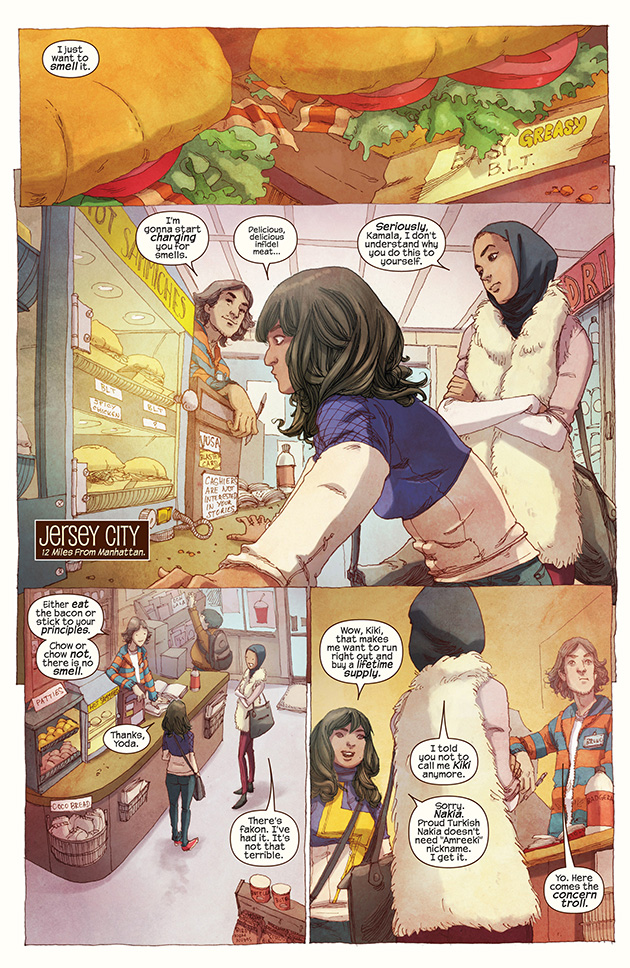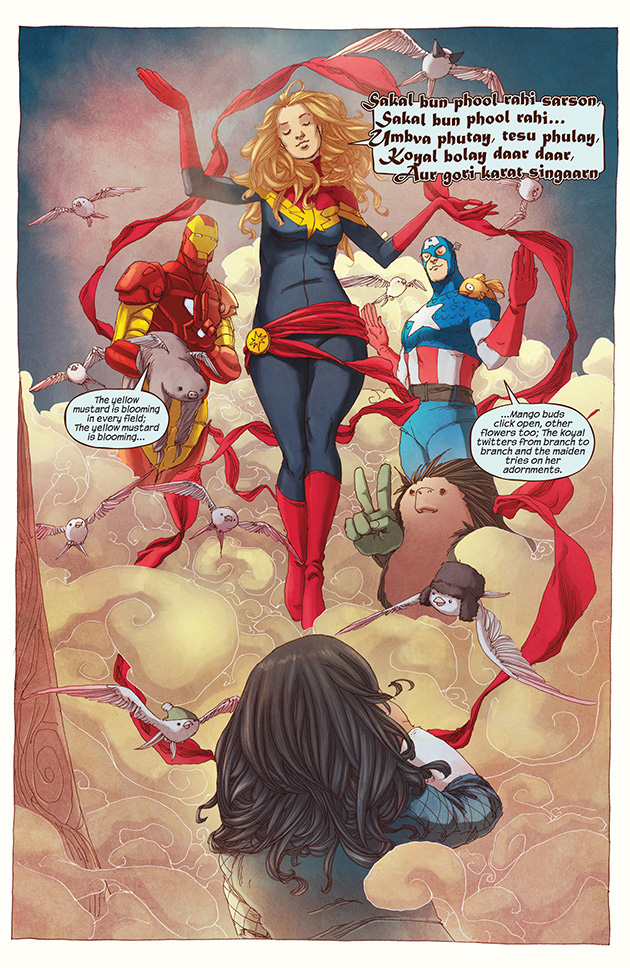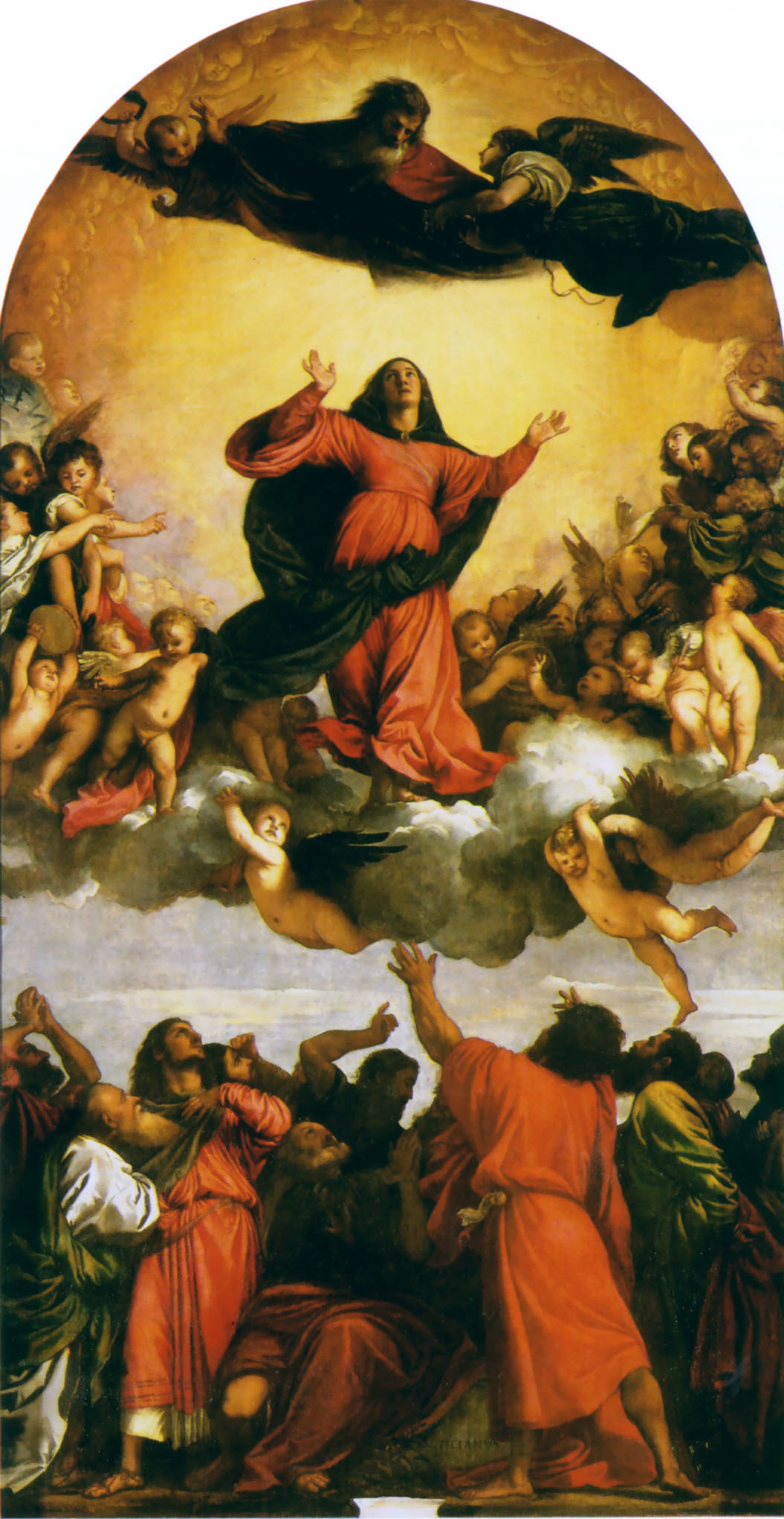Would you give G. Willow Wilson and Adrian Alphona’s Ms. Marvel to your daughter or young nephew to read?
I think the answer in most instances would be a loud and affirmative, “Yes!” It is after all quite inoffensive and mainly concerns the travails of school and family life; if complicated in this instance by the fact that the main protagonist is a Pakistani-American Girl. The comic is friendly, instructive, educational, and has a placid attitude towards the dangers of everyday existence. It would seem to be, in a word, “safe.”
And what exactly are the dangers Kamala Khan faces in her first three issues? She is tricked into taking alcohol by insensitive classmates, breaks her curfew and is grounded, is sent to detention for accidentally destroying school property, helps a pair of accident prone lovers, is involved in a friendly hold-up at a corner store, and is injured during the accidental discharge of a firearm.
In many ways Ms Marvel is a return to the more gentle pleasures of the comics of yore; dialing back the myth of a violent America propagated by TV shows like CSI, Criminal Minds, NCIS et al.—where murderous psychopaths reside on every corner and corpses are to be found on every other doorstep and school dormitory. Can a superhero comic subsists on stories culled from ordinary high school life? Well, the sales figures on future issues of the comic should tell the tale in due course.
The central issues at stake in Ms. Marvel are conformity and difference, subjects which are balanced precariously at this historical moment in America (and Europe) where the simple act of wearing a hijab might be cause for derision.
Perhaps the comics’ greatest achievement is to make the life of a Muslim girl in America perfectly ordinary. Part of the success of Jaime Hernandez’s Locas lies in just this effect—the way it shapes our understanding of an unfamiliar culture, revealing its core of basic humanity. Something similar occurs in Asghar Farhadi’s A Separation where the setting (environmental, legal) and motivations may seem strange but the reactions completely “human.” With that moment of recognition, Iranians stop becoming headline material or screaming terrorists (a la Ben Affleck’s Argo) but individuals in all their complexity.
I don’t think Wilson’s work is quite at that level in Ms. Marvel but there is a trace of gentle subversion about it; much of it related in humorous vignettes. A visit to the neighborhood mosque for a halaqah (religious study circle) is not an occasion for harsh harangues of deeply conservative mullahs but some questions concerning Islamic theology and issues surrounding the place of women within the mosque and society. The first page of issue one has Kamala sniffing a “greasy BLT” which is described as “delicious, delicious infidel meat”. This is followed by the suggestion that she try fakon instead (“it’s not that terrible”). Buddhists face similar philosophical “problems” when encountering vegetised meat dishes; a culinary art form in itself.
Wilson’s subversiveness doesn’t lie simply in these small challenges to authority but in more subtle mouldings of this thoroughly “white”, Christian-Jewish form of expression—the American superhero comic.
Present day Islam is not especially enamored of figurative works of art, but the image of Kamala confronting the Avengers in the form of Iron Man, Captain Marvel and Captain America is clearly an instance of borrowed iconography. Lamps are not rubbed in the course of issue one of Ms. Marvel but the Terrigen Mists and the appearance of the Avengers suddenly within its folds do suggest the appearance of Jinn bearing gifts, and we all know how badly that usually turns out. The soundtrack to their arrival is a qawwali song by Amir Khusrow (“Sakal ban phool rahi sarson”), sufi devotional music which some might find intoxicating.
That’s Captain America as an Islamic mystical being straight from the pages of the Qur’an (as angels are from the Bible). But more than that, the image is clearly a syncretisation of well known religious forms—it is a Transfiguration with Moses and Elijah on both sides of a female Jesus. Iron Man has his left hand raised in a gesture which either suggests the Trinity or the giving of a benediction. Captain Marvel herself is posed in a manner which immediately brings to mind images of the Assumption of the Virgin—right down to her flowing waist ribbon. The birds surrounding her are presumably modern day versions of the cherubs we see in Renaissance paintings. To borrow a phrase from Ms. Kamala Khan, it’s all “delicious, delicious infidel meat.” One assumes that Kamala—aged sixteen and forbidden to mix with boys at alcohol fueled parties—is a virgin herself. One also assumes that Wilson and Alphona are not entirely convinced of the merit of the iconoclastic claims of hadith literature.
AND LO! The angels said: “O Mary! Behold, God has elected thee and made thee pure, and raised thee above all the women of the world. Surah 3. Al-i’Imran, Ayah 42
Christopher ZF writing at The Stake is eager to let readers knows that:
“In this instance Kamala’s gods are not God, but another trinity that inspires her: Captain America, Iron Man, and the central religious figure of Kamala’s imagination: Captain Marvel….The manner in which Wilson and artist Adrian Alphona handle what could be a potentially fraught subject is instead refreshing in its candor…this scene is not a ham-handed, irreligious, or silly affair….”
The caution is understandable though obviously not my cup of tea.
This appropriation of imagery is clearly tied up with Kamala’s own conflicted sense of identity and her cultural influences (both knowing and unknowing)—a desire to fit equally into “normal” white American society and the traditions of her parents, with these parts seemingly irreconcilable. She’s a dark haired Alice in Wonderland, taking the bottle labeled “Drink Me” to become small or the cake with “Eat Me” written on it to become a leggy white blonde—all of this done in the interest of assimilation. The creators obviously thought long and hard (or maybe not) when they decided to make her a “human with Inhuman” lineage. Kamala’s vision is no more than a reflection of the mishmash which constitutes her subconscious desires. As “Iron Man” says to her, “You are seeing what you need to see.” If only Captain America was more halal.
Noah writing at The Atlantic doesn’t quite see it that way though. Concerning Kamala’s shape shifting powers he writes:
“You could see this power as a kind of metaphorical curse, reflecting Kamala’s uncertainty; she doesn’t know who she is, so she’s anyone or anything. I don’t think that’s quite what it signifies, though. Changing shape doesn’t mean that Kamala erases her ethnicity…Rather, in Ms. Marvel, shape-changing seems to suggest that flexibility is a strength. Kamala is a superhero because she’s both Muslim and American at once. Her power is to be many things, and to change without losing herself.”
And that is undoubtedly the final destination of Wilson’s story. The first three issues are in all likelihood a journey to that point of realization.
Perhaps the greatest subversion of all is that Ms. Marvel might be the most religious comic book published by Marvel in decades. Not anywhere as overt as the Spire Archie Christian comics but arguably in the same tradition. Islam both informs Kamala’s action and the conflicts she faces at school and at home.The centrality of Islam in Ms. Marvel was probably considered uncontroversial by Wilson’s editors (save Sana Amanat who is Pakistani-American) because of the ethnicity of the main protagonist—in America, race and Islam seem almost indivisible and therefore “excusable.” At the risk of stating the obvious, this rigidity in terms of race and religion is part of Wilson’s challenge to her readership in a country where the word “Muslim” often conjures up images of “brown” or black individuals. The fact that a blonde, white woman is taking moral action on the basis of the Qur’an is an essential part of Ms. Marvel’s narrative.
In Culture and the Death of God, Terry Eagleton writes that:
“Societies become secular not when they dispense with religion altogether, but when they are no longer especially agitated by it….as the wit remarked, it is when religion starts to interfere with your everyday life that it is time to give it up….Another index of secularization is when religious faith ceases to be vitally at stake in the political sphere…this does not mean that religion becomes formally privatized, uncoupled from the political state; but even when it is not, it is effectively taken out of public ownership and dwindles to a kind of personal pastime, like breeding gerbils or collecting porcelain…”
American society is “agitated” by Islam but Muslims have almost no voice in the political sphere. Kamala Khan may be the central figure of Ms. Marvel but she is an “other”—not us, someone strange, someone else—with seemingly little to say about how Americans should lead their lives; she has no religious or moral prescriptions which could affect white America. She is someone else’s porcelain collection. This makes the comic “tolerable” in the eyes of Marvel’s paymasters even while Disney enforces a policy of not taking the Lord’s name in vain in song.
The commentators at Deseret News have an even more innocuous explanation for this new venture:
“Comics are a “survey of the pop culture medium,” Hunter said, adding that the religions brought up in modern comics reflect modern society.
He said mainstream culture is talking about Muslims. According to the Pew Research Center, the Muslim population in the United States is projected to rise from 2.6 million in 2010 to 6.2 million in 2030, which shows Muslims are a growing market and topic in the U.S….Ms. Marvel’s Muslim heritage was chosen as a reflection of what the mainstream culture is interested in…Publishers are not just appealing to certain religious markets, however. They’re also using religious comics as a way to tap into the market of unbelievers, too, Lewis said.”
How wonderfully bland it would be if this was the comic’s sole raison d’être. This gentle and most politically correct of comic book stories is sometimes more clever than it seems.
____
Further Reading
(1) G Willow Wilson on Kamala’s powers. Lots of background information in this interview:
“Her power set was actually the toughest thing, I think, to narrow down in the character creation process,” Wilson said. “I really did not want her to have the classically girly power sets – I didn’t want her to float. I didn’t want her to sparkle. I didn’t want her to be able to read people’s minds. I think a lot of these sort of passive abilities are often given to female characters – becoming invisible, using force fields. I wanted her to have something visually exciting, something kinetic…. The idea of making her a shape-shifter nicely paralleled her personal journey.”
(2) Mariam Asad, Zainab Akhtar, and Muaz Zekeria discuss “What the new Ms. Marvel means for Muslims in Comics.”





I am duly relieved that you don’t hate this.
“Kamala Khan may be the central figure of Ms. Marvel but she is an “other”—not us, someone strange, someone else—with seemingly little to say about how Americans should lead their lives; she has no religious or moral prescriptions which could affect white America.”
I don’t think that’s true, actually. Presenting a Muslim as a hero is actually a moral and political statement in the current climate in the U.S. Moreover, when Kamala quotes the Quran about the value of helping people, it seems like that’s both (a) pointing out that the Quran is not evil, and (b) presenting its words as heroic inspiration, not just for Kamala, but for its readers.
As I said in my piece last week, too, I think the comics gentleness is a commentary and critique of superhero tropes in a number of ways.
So…it’s certainly not a politically radical book, but I don’t think it’s as apolitical as you seem to suggest. In fact, in comparison to most of DC and Marvel’s output, it seems extremely engaged in political and moral issues beyond the usual “hit the bad guy, fight crime.”
Yes, presenting a Muslim as a hero is a moral and political statement but it’s also often used by more hawkish elements in the same way racist use the “I have a lot of black friends” excuse. So, for example, there’s a brave, intelligent Muslim CIA analyst (who wears a headscarf) on the otherwise incredibly Islamophobic TV show, Homeland. The U.S. is in Iraq to save the “good” Muslims etc. etc..
When Kamala quotes the Qur’an as heroic inspiration, it’s obviously meant to demonstrate the moral aspects of Islam to readers. But my feeling is that non-Muslim readers will also quickly consign that thought to a safe corner by the way side since it has no bearing on their lives. Superman may derive from Jewish-Christian tradition but I can’t see him quoting chapter and verse without some controversy in this day and age. (Or maybe he has – I hardly read superhero comics nowadays.) Depicting Superman as a Christ figure (as in All Star Superman) on the other hand seems pretty fine since it’s a “blasphemous” appropriation. Ditto Daredevil in Born Again and the half-baked (wink wink) Catholicism. But Superman as a practicing Christian/Jew…? I can’t see that happening at all (or imagine how bad that would be).
I’m not saying that Ms. Marvel is apolitical. I’m saying it’s being treated as apolitical despite its semi-radical (for a comic) religious message. Possibly because of how it’s perceived within wider American comics culture (which is largely white non-Muslim) – as a sort of pat on the back. Just think about it, not only does Kamala quote the Qur’an, she actually wants to be like Mary, one of the most respected women in Islam.
I don’t know; that seems kind of a stretch, Suat. The comic explicitly presents the Quran as relevant to moral issues, and has a hero who views it as such. But it doesn’t matter because you imagine readers won’t see it as relevant, therefore it can’t matter? I don’t follow the reasoning.
Presenting the Quran as a source of ethical wisdom and possibility seems like a pretty strong political statement, and I think it remains so even if folks accept that as normal. It seems like you’re reacting to the fact that it’s not radical by saying it doesn’t have any effect. I don’t think those two things are the same.
It pains me a bit to say this, but I find the above tableau, of Captain America and Ms Marvel and Iron Man, pretty appalling.
Not out of a sense of religious outrage. I think irreverence is fine. The problem is that its not irreverent at heart– these are licensing properties, who are earnestly being likened to religious figures, goldfish and mutant porcupines aside. On the part of Marvel, there’s a slight wink and a nudge, a bare attempt to defuse through silliness, but mostly, I read a smug, contented bliss that yes, these characters are culturally important in this way. That this is a fitting representation of them. Gross.
No, I’m saying that it’s semi-radical religious message is being brushed aside because Muslim ethics and theology don’t have a prominent place in American cultural discourse; not because of the general tolerance of comics readers. You see Marvel/DC rushing to publish any other comics with a strong religious message? I think this one just “slipped by” unlike Swamp Thing as the True Cross.
>>>That this is a fitting representation of them. Gross.
Gross is better than bland though. Many comics readers probably do find Iron Man more interesting than Jesus.
>>>Gross is better than bland though. Many comics readers probably do find Iron Man more interesting than Jesus.
Absolutely they do. I’m not saying they should or shouldn’t. But as someone who hasn’t read this comic, I suspect that Marvel is using this Ms Marvel, American-Pakistani fan-girl and all, to make a case of their own centrality, not just as entertaining pop culture, but as a source of religious feeling. That the experience of fandom goes that deep. And maybe it does. Even grosser.
I mean, could Marvel have told a story about an American-Pakistani girl, her body image and navigation of Islam and American culture, and her problematic transformation into an Aryan super heroine, without glorifying Marvel itself?
Hmm…superhero fandom isn’t as religious (in feeling/devotion) as Star Wars fandom but I suppose you’re right.
They could have told the story without the Avengers but the Captain America movie just came out and Marvel is obsessed with media crossovers. Tony Stark gets mentioned as often as they can nowadays. I will say that Captain America as a Muslim fantasy is pretty weird.
I guess to link this back into the other comment strand–
Yeah, this religious iconography might just have “slipped by.”
On the other hand, since 1989, there’s been a greater influx of fan-employees into the big 2, pop-culture’s become addicted to gravity, and the nature of the superhero universes has changed. Are comics publishers half-convinced that this kind of imagery is merited? As long as you’re silly about it, on the surface?
Wink wink, nudge nudge, big smug smile.
True. Captain America as a Muslim fantasy is weird. Pure absurdity. At first, I’m so glad that fantasy made it to the press. But maybe that wasn’t a delightful slip-up, and maybe Marvel is legitimately making the case that Captain America is the kind of hero that can manifest across religious boundaries, because he is that universal, good and meaningful.
Marvel as folk religion.
That does work as subtle propaganda – America the indispensable, exceptional and good.
As for your earlier comment, maybe the U.S. is truly easing into a post-Christian phase, all evidence to the contrary. No one cares one way or another. At least no one cares about comic pamphlets. The silliness does help a bit.
I’ve only read Issue 1 thus far of this, but I just think the CA and Iron Man appearance here is the “necessary” reminder that these stories take place in the Marvel Universe and crossovers will ensue when the almighty dollar demands it. The fact that it may be in poor taste to deliver this message in this particular way, I fear, is more of an accident than in the service of some kind of transgressive intent (or even the metaphor of Marvel as religion).
Kailyn, have you read the issue? It’s really presented not as “superheroes are gods” but as Kamala’s view in particular. There’s other stuff in the issue about how she idolizes Ms. Marvel and writes Avengers fan fic. She’s invested in these characters, that’s why they appear to her this way.
It’s not really glorifying Marvel…it’s presenting Marvel and superheroes as icons of assimilation, which have both good and bad aspects. Ms. Marvel’s costume gets critiqued, and there’s an implicit critique of the overwhelming whiteness of superheroes too, I think.
The book is pretty smart about these issues, I think.
eric, the characters here aren’t the characters from the marvel universe; they’re Kamala’s vision. It’s actually kind of confusing in terms of crossover stuff. Wilson is pretty careful to make the superheroes thematically about assimilation, for good and ill.
I talk about all of this in the Atlantic article Suat linked above, fwiw.
I think you only need look at material like Kingdom Come, Marvels, SIlver Surfer: Requiem or Flex Mentallo to see that these publishers and many of the creators in their bullpens certainly do have a reverence for these characters and believe in them as modern mythology and figures to be deified, rather than corporate IPs used to tell primarily action stories and sell millions of dollars of lunch boxes that I would view them to be.
@ Conor Palmer
Well, I want neither unwarranted pretention nor cynicism, but between the two, I’ll take the former.
Well, superheroes have become folk heroes, like John Henry or Paul Bunyan, and there is power in that, but it’s not the same as deifying them. Maybe folk heroes are what the gods and demigods of mythology deteriorated into, or maybe they always served that purpose, as well as religious purposes?
Kailyn, I don’t think Marvel meant to say that these characters are God or gods, only that they are important to Kamala, so they appearing her vaguely ecumenical fever-dream-slash-vision. They need to be important to her to explain why she decides to use her powers by putting on a costume and saving people. It’s an odd decision, so as Chabon pointed out in Kavalier & Clay, the “why” is really the most important question.
Kamala’s Muslim faith, her Pakistani heritage, her American life and citizenship, and her love of superheroes and the best aspects of what they represent are all key to Kamala’s identity and her decision. I saw a quotation of Ai Wei Wei’s recently that I loved: “Life is not about finding yourself. It is about creating yourself.” Ms.Marvel is the story of Kamala creating herself, and my family is loving it, to answer Suat’s opening question.
I disagree with Suat on one point, though. Marvel is not getting away with this because Kamala is “other.” One point of the story is that she’s not “other” at all. And Marvel gets away with religious (or explicitly irreligious) characters when they treat the topic intelligently and in a manner consistent with what is known of the character. Examples include Nightcrawler’s Catholicism, Hank Pym’s atheism, and Tony Stark’s discomfort-bordering-on-fear-that-it-might-be-real agnosticism. The last one is charmingly complicated by all the time Stark spends in church basements at AA meetings.
The portrayal I’ve had the most trouble swallowing is Hickman’s portrayal of Reed Richards as a confirmed atheist. More than anyone else in Marvel, Richards represents wonder and the willingness to entertain the fantastic (sorry, but it’s the perfect word). I always imagined him as an agnostic who excitedly hoped to meet God someday — and of course, make him the subject of a detailed examination and lengthy study.
Pingback: Kibbles ‘n’ Bits 5/15/14: Lots of women at ECCC; first Walking Dead Season Five teaser, etc etc etc — The Beat
Pingback: Kibbles ‘n’ Bits 5/15/14: Lots of women at ECCC; first Walking Dead Season Five teaser, etc etc etc | ComicBookRAW
Pingback: "Ms. Marvel (2014 Ongoing)" Series Talkback (Spoilers)